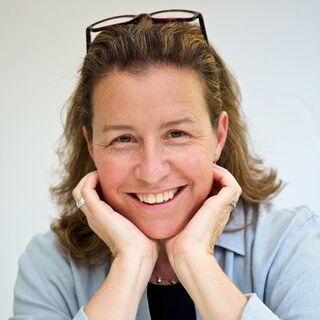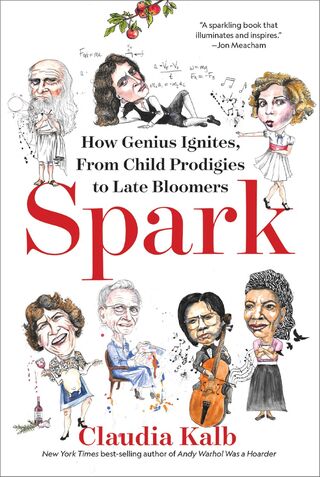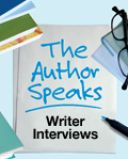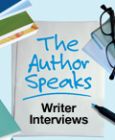Creativity
Spark: How Genius Ignites, From Child Prodigies to Late Bloomers
The Book Brigade talks to science journalist Claudia Kalb.
Posted April 8, 2021 Reviewed by Davia Sills
Key points
- Despite the myth of the lone genius, the most creative people require collaboration and the support of others to achieve greatness.
- Genius arises from a combination of genetic and environmental factors.
- There is no expiration date for genius—with curiosity, hard work, and a little luck, people can achieve their creative potential at any age.

We see the core of genius as great intellectual potential and admire it from afar. But genius means little unless it’s harnessed to work, to curiosity, and even to courage.
First of all, what is your definition of genius?
No one has discovered a single source of genius, and such a thing will almost certainly never be found. I see genius as the pinnacle of potential—the ability to harness intelligence, curiosity, perseverance, and luck to forge a new way to see and think and hear and understand. Genius requires a willingness to fail, a passion to pursue, and an idea or concept so transformative it changes a field forever.
It’s important to note that the subject of genius does not define the individuals in Spark. Instead, I use it as a framework to explore the creative journeys of 13 remarkable people. Although they differ in numerous ways—the eras in which they were born, the privileges and traumas they endured, the livelihoods they pursued—they share some combination of these characteristics, which have fostered their achievements and serve as common threads tying the first page to the last.
What have we gotten wrong about genius?
Too often, genius is viewed as unattainable, inhuman—a mind touched by the gods. The reality is that great minds work diligently at their craft. Picasso, for example, painted at all hours of the night. He never stopped. The more you create, the more likely you are to revolutionize a field.
There’s also the myth of the lone genius. The reality is that collaboration, in one form or another, is critical. Newton’s revelations did not emerge solely from the depths of his own knowledge; he built on the foresight of scientists who came before him, including Copernicus, Galileo, and Descartes. Maya Angelou had an editor, Robert Loomis, who prodded her to write her first book and then encouraged and supported her through dozens more. When he retired in 2011, she remarked, “I can’t imagine trusting a manuscript in the hands of anyone else.” Even geniuses can’t do it all on their own.
How does difficulty, or challenge, or whatever you call an obstacle or trial, fit into genius?
Obstacles are critical to success. Every one of the individuals I profile forged his or her way through exceedingly challenging experiences. Eleanor Roosevelt lost both of her parents by the age of 9; her pain and the solace she sought forged an inner strength that she drew on throughout her life as an advocate for human rights. Angelou lived with the traumas of rape and racism but was never defeated. Instead, she penned words of pain and glory.
In science, mistakes and failure are an integral part of the process. The extraordinary cancer researcher Judah Folkman made this clear to me years ago when I talked with him about his research. As I asked him about advances he’d made in the field, he pointed to dozens of reports lining a shelf behind him—“those are all experiments,” he told me, “that didn’t pan out.” Learning what doesn’t work opens the mind to what might.
Can someone set out to breed or raise a genius, or is investment in an outcome antithetical to the process?
The most important thing parents can do for their children is introduce them to new experiences and cultivate and nurture their interests. No one can create a genius.
The phrase “solitary focus on a subject” leaped out at me. How does it figure in?
Child prodigies focus on single pursuits—chess, music, art—and excel at an early age. But most do not grow up to be geniuses, no matter how flawlessly they master a skill; often, their solitary focus leaves them detached from peers and unable to navigate stresses as they age.
But a solitary focus can also allow for remarkable innovation. Newton’s interest in the natural world emerged when he was a child and captivated him throughout his school years and in his career as a university lecturer. At 27, he became a professor of mathematics and in his mid-40s published the results of his research in his landmark work, Principia Mathematica.
Curiosity—what role does it play in creating or releasing genius?
It’s the rocket fuel. If you’re curious, you’re going to ask questions, open yourself to new experiences, and seek knowledge relentlessly. One day, in his quest to better understand bacteria, Alexander Fleming decided to investigate the biological components of his stuffed-up nose. He later noticed that the substance appeared to be inhibiting the growth of bacteria in a lab dish—a revelation that played a role in his discovery of penicillin.
Curiosity allows the mind to connect disparate ideas, to think beyond the norm. Leonardo da Vinci did this in his artwork, jumping from one subject to the next—botany, biology, geology, architecture, astronomy, costume design, optics, cartography, and anatomy. He hunted for information, jotting notes to himself to “describe the cause of laughter.” He questioned everything: Why are stars visible by night and not by day? What separates water from air? Where is the soul?
What elements of nature and what elements of nurture seem to play important roles—and did you discern anything about the way they interact?
Nature and nurture work together. Talent won’t go anywhere if you don’t practice. Potential also needs cultivating by parents, teachers, and mentors.
Picasso’s father was an artist who taught his son the fundamentals of drawing. Yo-Yo Ma’s father was a violinist and his mother a singer; music was their life force. Roosevelt’s teacher rooted out her intellect and encouraged her to experiment with fresh ideas. Our genes make us who we are, but they don’t determine our thought processes or behavior. Environment matters, too.
Carving a direction all one’s own—what does it take, besides courage and a certain amount of confidence?
A willingness—and a desire—to take risks and a yearning to learn. Grit, perseverance, and always some amount of luck. Leonardo had the good fortune to be born during the Renaissance; Shirley Temple’s career as a child star coincided with America’s desire for an antidote to the Great Depression. Fleming’s discovery of penicillin might never have happened if he hadn’t left his lab dishes out on his worktable during summer vacation. Luck is often overlooked—but almost always essential.
What does it take for inspiration to strike—why do some people develop a talent or passion as children while others find their moments in midlife or later?
This is the question that drove me to write Spark. While the arc of discovery ignites early in life for some, the middle years serve as a reawakening for others. The momentous experiences that transpired for the midlifers profiled in Spark—Julia Child, Maya Angelou, and Alexander Fleming—occurred when they were in their 30s and 40s. Child’s life experiences led her to Paris, where she discovered French cooking. And she capitalized on her middle-agedness to entice her fans.
Late bloomers, meanwhile, may rediscover childhood passions that they set aside or uncover a talent that had no time to emerge early on. Peter Mark Roget, of thesaurus fame, revisited his love of words—an interest that surfaced when he was a child—late in life. He published the first edition of his thesaurus in 1852 when he was 73 years old. Grandma Moses spent most of her early years working on a farm and raising children; she turned to painting as a grandmother seeking a sense of purpose.
What lessons about genius apply to ordinary lives?
Great achievements in any field require deliberate and purposeful commitment. One thing we can learn is that the traits we most admire in others do not always come easily, and we may need to be intentional about choosing them for ourselves. Sara Blakely, the entrepreneur who founded the multimillion-dollar company Spanx, told me she works at being courageous; it doesn’t come naturally. Ma chooses optimism. Genius need not be vaulted onto a pedestal. We can all be intentional about our goals.
What is the most surprising thing about genius you discovered in your work?

I loved the very human connections I discovered among the great minds I profile. Picasso and Newton were both so feeble at birth that they were feared dead. Temple and Angelou lived radically different but parallel lives: Both were born in April 1928 and died within months of each other in 2014. Shirley Temple visited Eleanor Roosevelt at her home in Val-Kill in 1938. I think these connections symbolize the bonds that exist between all of us.
If you had to limit yourself to one item, what one idea or insight would you like readers to get from this book?
Creativity has no expiration point. Your age is not what matters—it’s your attention to ideas, your desire to learn, your passion to pursue. There’s still time.
About the Author:
Claudia Kalb, a science journalist, is the author of Spark: How Genius Ignites, From Child Prodigies to Late Bloomers.
About The Author Speaks:
Selected authors, in their own words, reveal the story behind the story. Authors are featured thanks to promotional placement by their publishing houses.




